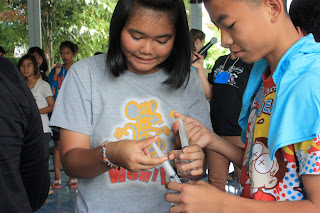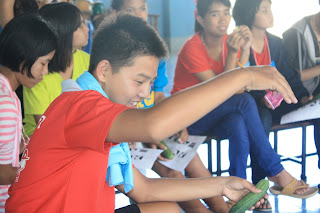Earlier this month I held a camp about HIV/AIDS for youth in my village. We had 30 youth attend who were selected from the community because they either have HIV, lost a family member to AIDS, have a family member living with HIV/AIDS, or demonstrate risky behaviors. The camp was designed to educate the youth about transmission and prevention of HIV, while also focusing on reducing stigma and providing support to anyone who has HIV or who has lost someone to AIDS. My vilIlage has over 80 people living with HIV and I am sure there are many more who are undiagnosed or simply have not registered with the hospital. One young woman who came to help at the camp received HIV from her mother and has been living her whole life in the shadows so as not to make others uncomfortable around her. She is careful about not eating with people, cooking food, or even touching someone. While she knows that she can not transmit HIV to someone through any of those actions, she knows that others do not understand this and are often nervous around her. Hearing how she has adapted her life because of the stigma that surrounds HIV was heart breaking, and made me realize how important HIV/AIDS education is.
The first day of the camp we had 30 youth attend. All sessions were led by the local hospital, an NGO, and the leader of one of the youth groups. There were also many adults with HIV present to act as role models and show support for the project. The first session was a relay race that involved using condoms as balloons, an AIDS ribbon jig saw puzzle, and HIV T/F statements. A nurse followed up with questions about what the youth have heard about HIV, where they get information, and if they believe there is a stigma associated with HIV. Other sessions involved learning how to properly use condoms by practicing on cucumbers, and HIV role plays about stigma. My favorite session of the day was a water exchange activity that showed the youth how one person having HIV in a group of 30 can easily spread to 10 people if they do not use condoms to protect themselves. It also demonstrated how abstaining from sex is 100% safe, while having one committed partner is also safer than having multiple partners. The last activity of the day was an anonymous questions box where each youth had to write at least one question they have that they feel uncomfortable or embarrassed to ask.
The second day of the camp all of the youth had to bring a family member or adult that they are close to with them. The first activity of the day was answering questions from the question box which surprisingly went really well. The parents were able to learn what kinds of questions their children have, and also hear the answers. In the afternoon the kids made posters about stigma, prevention, transmission, and services our community offers to people living with HIV/AIDS. The posters came out great so we posted them in both of the schools, the health center, and the local government office to educate others about HIV/AIDS. The adults had a separate session with a nurse learning how to talk to kids about sex and giving them the facts and information they need before trying to talk to their kids. Some of the parents wrote me anonymous notes that I found the next day thanking me for doing the camp and telling me that they got a lot out of it and think their kids did too.
The two days of the camp I didn't end up doing much of anything but sitting around and eating snacks and drinking tea. I planned all the lessons, made all the materials, bought the food, ordered the t-shirts and then just got to sit around and relax. I had two PCVs come to help me, which was great to have other people there for my community to meet, but I felt bad that they came all the way from their sites and then didn't get to do much. However, in reality that was exactly what should have happened. It was a camp that I helped create, but that day of my community could have completed without me ever showing up. The next week I even got to have two of the girls who attended the camp come show the posters and educate students at another school about HIV/AIDS without me having to say a word. While it certainly wasn't a perfect project, and there are things I would change and do differently next time, it was a great experience and a project that hopefully helped to change the way a few people in my community think about HIV/AIDS.













